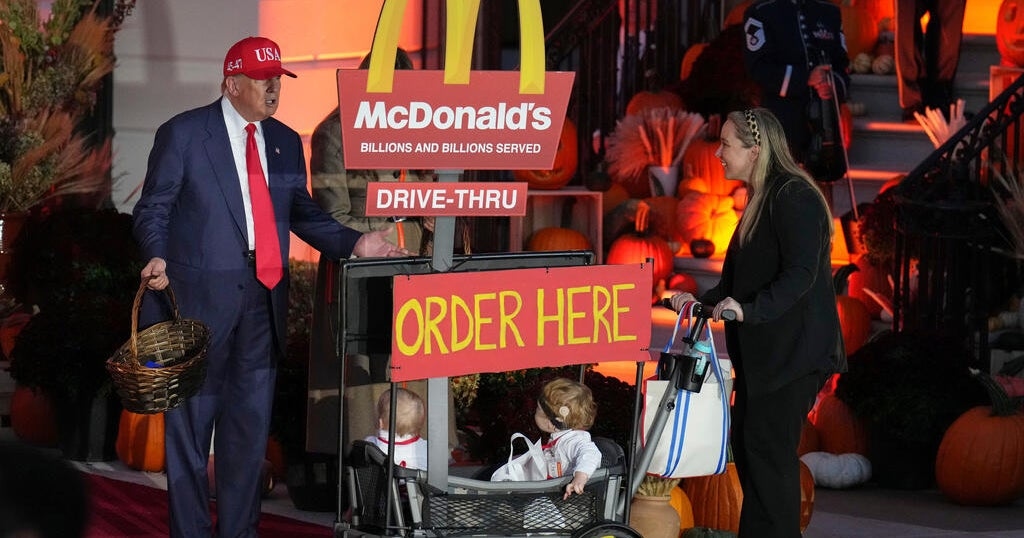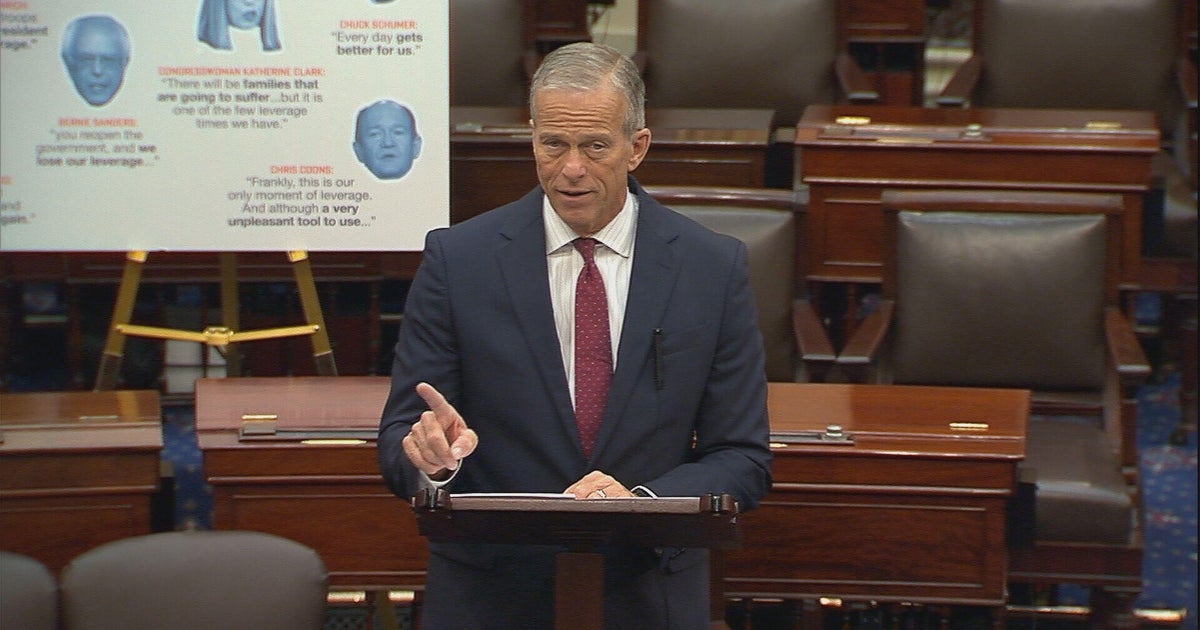Senate adjourns for the weekend with no breakthrough on ending shutdown
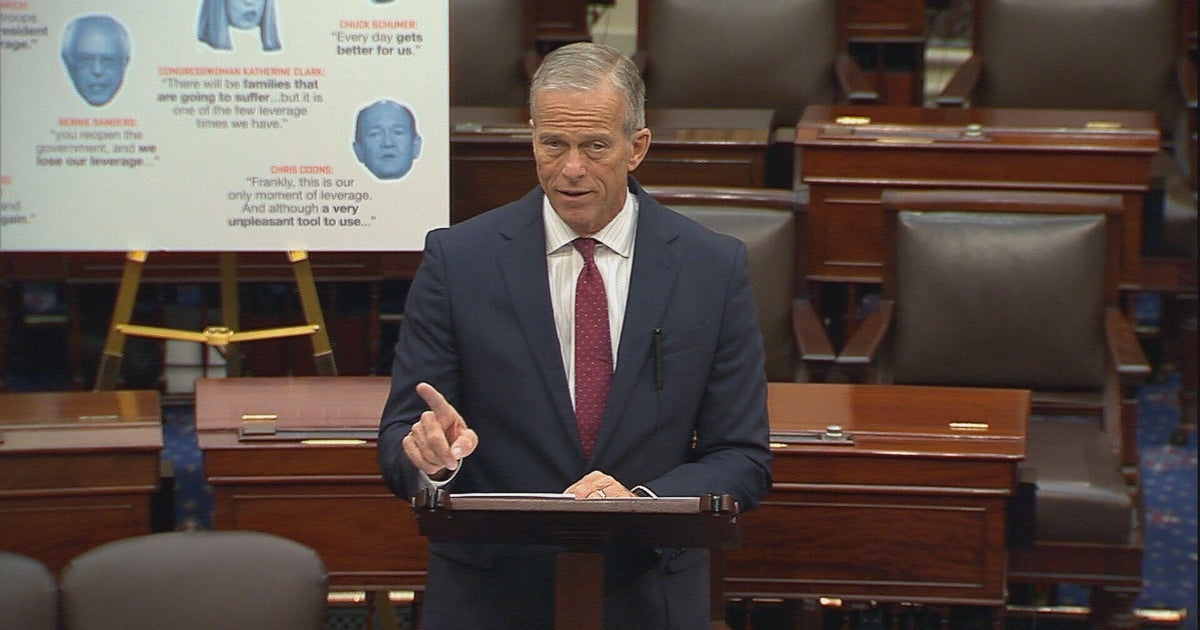
- The Senate adjourned on Thursday and won't meet again until Monday, extending the government shutdown until at least its 34th day, which would match the longest funding lapse in U.S. history.
- Senators continued to express cautious optimism about bipartisan talks over reopening the government and passing longer-term appropriations bills, but Thursday saw no apparent breakthroughs, and the upper chamber did not vote on the House-passed continuing resolution.
- Senate Majority Leader John Thune told CNBC that "a lot more conversations" are happening between rank-and-file members, and suggested that next week's elections might provide the catalyst needed to end the stalemate.
- Funding for food stamps under the Supplemental Nutrition Assistance Program is due to expire on Saturday, leaving 42 million Americans without access to benefits. Several senators said the freeze would increase pressure on both sides to reach a deal.
Nearly a month into the shutdown, food banks across the country are already straining to meet rising demand from hundreds of thousands of federal workers who are furloughed or working without pay.
Now, they are bracing for an even bigger surge.
Carlos Gomez, a federal employee based in San Antonio, Texas, has been relying on a local food bank to feed his family during the government shutdown.
"I have a very large family, so it's getting kind of hard. Whether the government is shut down or not, bills need to get paid," Gomez said.
Omar Villafranca and Allie Weintraub
The head of a group that represents charitable organizations said Thursday that food banks will be "pushed past the breaking point" if federal food aid is cut off this weekend.
"Nonprofits can't possibly meet the tremendous new need that'll be created when 42 million people lose access to basic food security," National Council of Nonprofits CEO Diane Yentel said on CBS News' "The Daily Report."
Payments for the Supplemental Nutrition Assistance Program, or SNAP, are set to come to a halt on Saturday due to the government shutdown, the U.S. Department of Agriculture says.
The National Council of Nonprofits and several other groups filed a lawsuit against the federal government Thursday, arguing the Trump administration doesn't have the legal authority to suspend SNAP benefits and must tap into a USDA contingency fund to keep the program going. USDA argues it doesn't have the legal authority to use that $5 billion fund, which the lawsuit pushed back on.
Yentel told CBS News that if SNAP benefits are cut off, food banks and food pantries will shoulder the burden of helping the approximately one in eight Americans who use SNAP to get groceries.
She said that, even prior to the end of SNAP, food banks have been under pressure due to high grocery prices and a government shutdown that has left thousands of federal workers without pay.
"It's more than most food banks can handle," she said. "They're having to turn people away or they're having to ration assistance so that everybody gets something."
Flights out of Orlando International Airport are delayed for more than two and a half hours on Thursday night due to a lack of air traffic controllers, the Federal Aviation Administration says.
Other airports with staffing-related delays include Ronald Reagan Washington National Airport (90 minutes) and Dallas-Fort Worth International Airport (21 minutes).
Airports have faced on-and-off delays due to short-staffing in recent weeks as air traffic controllers face missed paychecks. Controllers are expected to keep reporting to work without pay for the duration of the shutdown, and will receive back pay when the government reopens, but the number of staff who have called out sick has risen since the shutdown began.
Earlier this year, federal tax attorney Isaac Stein began setting up a hot dog cart as a "fun backyard weekend art project" — but after the government shutdown caused the Internal Revenue Service to send him home from work without pay, it's turned into a daily gig, he told CBS News' "The Takeout."
Stein said he intended for the stand — called Shyster's Dogs — to be both a form of artistic expression and a for-profit business. He secured local permits and started operating in D.C. on weekends last month, and since getting furloughed on Oct. 8, he has been out selling hot dogs "pretty much every day."
"It's absolutely wild. It's gangbusters," he said, adding that he usually sells out in less than four hours.
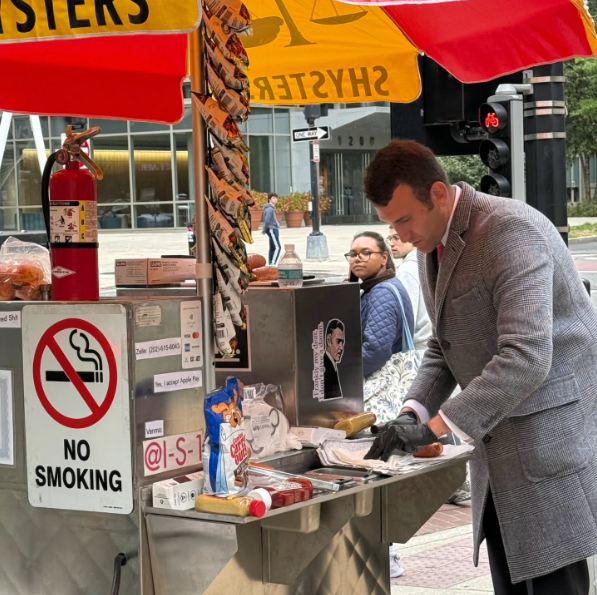
"I really came out here with the intent to just share my art and my attempt at humor, and people really seem to be responding," he told CBS News congressional correspondent Caitlin Huey-Burns.
But when the government reopens, the allure of running an old-timey street cart won't keep him from the office.
"At my earliest opportunity, as soon as I'm called into work … my intent is to return to my federal job," he said. "I really look forward to doing that as soon as possible."
The nation's aviation system is approaching a "breaking point" ahead of the holidays as air traffic controllers miss paychecks, causing sporadic delays at airports nationwide, Airlines for America CEO Chris Sununu said on CBS News' "The Takeout."
But the airline trade association CEO said the breaking point will be marked by further delays and cancellations, not safety issues.
"The skies are safe, there's no question about it," Sununu, a former Republican New Hampshire governor, told CBS News congressional correspondent Caitlin Huey-Burns. "That's why there are delays out there, because they slow things down to make sure that safety is paramount."
Air traffic controllers are required to keep reporting to work without pay during the shutdown, but the number of staffers who have called out sick has risen, leading to delays as the Federal Aviation Administration responds to short-staffing by slowing down traffic.
The top House Democrat cast some doubt Thursday on Senate Majority Leader John Thune's suggestion that bipartisan discussions to reopen the government are gaining ground in the Senate.
"It's not clear to me that John Thune is being accurate when he reports that there's an uptick in bipartisan communication," House Minority Leader Hakeem Jeffries, a New York Democrat, told reporters. "What communications is he talking about?"
Thune, the top Senate Republican, has said in recent days that more conversations are taking place between Democratic and Republican senators — one of the first signs that an almost monthlong stalemate could break. Still, the Senate adjourned for the weekend on Thursday without a breakthrough.
It's not clear whether House Democrats like Jeffries would be part of those talks. The House has been out of session since last month, and Republicans' position is that the Senate should pass a bill approved by the GOP-led House to end the shutdown with no strings attached.
Thune said he expects talks among members to continue over the weekend.
"I'm sure there will be discussions. We've got members on both sides who are continuing to dialogue," he told reporters.
"I hope as the pressure starts to intensify and the consequences of keeping the government shut down become even more real for everybody, that they will express, hopefully, new interest in trying to come up with a path forward," the majority leader added.
He reiterated his offer of giving the Democrats a vote in the Senate on extending health care subsidies, and said that "at some point they have to take yes for an answer."
Thune also said that his flight to leave D.C. is delayed. The FAA said earlier that flights out of Reagan National Airport would be delayed due to staffing shortages.
Thune was also asked about whether he had spoken with Democrats himself.
"I don't have anything to report on that. But again, like I've said before, when they're willing to produce the votes to open up the government, we're ready to talk," he said.
A reporter asked him whether he was "optimistic that this will end within the next week or two."
"I'm always optimistic, aren't you?" Thune replied.
Democratic Sen. Jacky Rosen of Nevada objected to Thune's attempt to adjourn the Senate for the weekend, saying on the floor that leaving is "truly outrageous."
"After doing absolutely nothing all year to prevent a massive spike in health care costs, Senate Republicans now want to go home for yet another weekend and do nothing, just like the House Republicans have been doing for the past month," Rosen said. She argued the Senate should remain in Washington to continue talks.
Thune restated his motion and it was adopted by voice vote, meaning the Senate stands adjourned until 3 p.m. on Monday. Rosen did not ask for a recorded vote.
Sen. Katie Britt, an Alabama Republican who's on the Appropriations Committee, told reporters she's spoken with Minority Leader Chuck Schumer to "lay the foundation" on continued appropriations work.
"I hope at some point that Chuck realizes that we need to open the government up," Britt said. "We need to do our job."
The conversation comes as lawmakers continue talks to reopen the government, while also separately pursuing full-year funding measures.
Britt said if the three-bill appropriations package under discussion were to be approved by both chambers and signed by the president, "that's funding SNAP, that's funding veterans, it's funding a number of important priorities."
Britt and Sen. Susan Collins, the top GOP appropriator, met in Thune's office Thursday morning.
Thune, asked about the conversation, indicated he's supportive of conversations like the one between Schumer and Britt, saying that "hopefully something will bear fruit."
"The solution here is not going to run through Schumer," Thune said. "I can't imagine him voting for anything that opens up the government."
Asked about next week's elections, Thune said it "seems to be another inflection point," adding that he hopes it frees Democrats up to vote for a measure to reopen the government.
Kaia Hubbard and Alan He
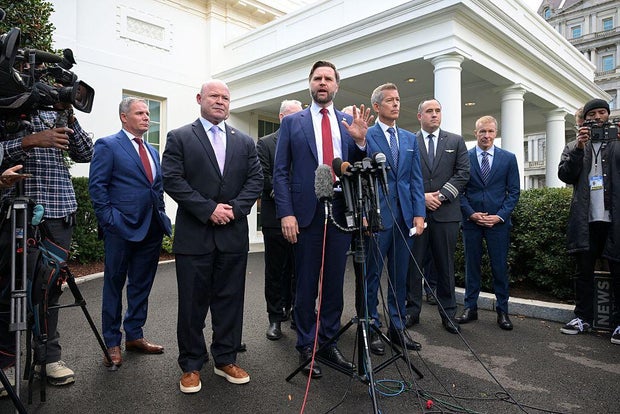
Across town at the White House, Vice President JD Vance spoke to reporters after a meeting with Transportation Secretary Sean Duffy and aviation industry officials about the shutdown's impact on air travel. He said the shutdown could wreak havoc on Americans' travel plans if the stalemate is not resolved by Thanksgiving.
"It could be a disaster. It really could be. Because at that point, we're talking about people who have missed three paychecks, they've missed four paychecks. How many of them are not going to show up for work?" Vance said, referring to federal employees at airports. "You take the TSA lines that are already too long, even right now, and say half of those people don't show up for work. Not because they're not hard workers or good people, but because they've got to find a different job to feed their families. What happens when the security lines are not an hour long, but they're four hours long?"
TSA agents and air traffic controllers have been working without pay since the shutdown began. Staffing shortages from workers who have called out have been popping up across the country as the shutdown continues. In 2019, travel-related disruptions caused by TSA workers calling in sick were seen as a major factor in ending the shutdown, which was the longest in history at 34 days.
Vance said large staffing shortages would "lead to massive delays."
"We want people to be able to get home for Thanksgiving. We want people to be able to travel for business, to make this entire engine of commerce work. We want the aviation industry to work. It's not going to work unless the Democrats reopen the government," the vice president said. "These guys are doing heroic things to make it work as well as it possibly can, but every single person I've talked to, to a word, they're worried that the delays are going to reach a point where it makes it very, very hard for the American people to fly."
As senators wrap up votes and prepare to head out of town for the weekend, they will likely run into delays at Reagan National Airport, the preferred point of departure for lawmakers.
The FAA issued a ground stop Thursday afternoon, which became a ground delay about 45 minutes later. Flights are delayed by an average of 90 minutes, according to an FAA notice. The agency said staffing shortages were the cause.
The delays coincided with a meeting at the White House led by Vice President JD Vance about the impact of the shutdown on air travel.
Democratic Sen. Chris Coons of Delaware attempted to pass a measure to pay members of the armed forces under unanimous consent, saying that "while we keep fighting for better health care, more affordable health care for all Americans, my bill will pay our armed forces now."
But Sen. Mitch McConnell, a Kentucky Republican, objected to the request. Any one senator can block a request for unanimous consent.
"Government shutdowns have real consequences," McConnell said. "Incredibly, it seems to have taken Democrats a month to remember that the proverbial stove is in fact already hot. And yet, they're not ready to turn it off, just turn it down a notch. Just low enough that they can take the political heat."
McConnell said the military deserves "a lot better than a government shutdown that jeopardizes their paychecks" and services. But he said "the surest way to help service members and civilian DoD employees is to simply turn government funding back on and pass full-year appropriations."
The Senate voted to approve a resolution that would block President Trump's tariffs on countries around the world, the third in a trio of rebukes of the president's trade policy this week.
In a 51 to 47 vote, four Republicans joined Democrats to approve the resolution. Republican Sens. Mitch McConnell and Rand Paul of Kentucky, along with Susan Collins of Maine and Lisa Murkowski of Alaska, supported the resolution. It was not subject to the 60-vote threshold needed for most legislation, requiring just a simple majority.
The resolution almost certainly won't be taken up by the Republican-controlled House, making it largely symbolic. Democrats forced a vote on the resolution, which was led by Sen. Ron Wyden of Oregon, by bypassing Senate GOP leadership using a provision of the International Emergency Economic Powers Act, the law that the president invoked to impose the tariffs.
Read more here.
Senators at the Capitol continued to express cautious optimism about the state of conversations to end the shutdown on Thursday.
Sen. Kevin Cramer, a North Dakota Republican, told reporters he's "seeing some movement," noting that "there's a lot of negotiating going on right now among members."
"I've seen more discussions. Some of the Democrats I've talked to are exasperated themselves and see no real benefit, politically or otherwise," Cramer said. "And I think they are ready, perhaps after next week's elections, to vote yes."
Cramer argued that Senate Minority Leader Chuck Schumer has organized Democrats against the House-passed measure to reopen the government because "his left flank has him scared."
"But I think his normal flank is starting to exert a little bit of their influence, and it's time for them to push the easy button and open the government, start negotiating these other things that they say they care about," he said.
Meanwhile, Sen. Richard Blumenthal, a Connecticut Democrat, said there are ongoing conversations, which "may be becoming more serious because the shutdown is imposing greater and increasing loss." But he said talks "will go nowhere if Republicans remain completely intransigent and resistant to any compromise on extending the health care coverage."
Blumenthal said that he's hopeful the president's return to Washington will kickstart an end to the shutdown. "There's an easy, ready path to reopening the government if Donald Trump shows some leadership," he said.
"This shutdown could end the moment he lands, if he simply gives a thumbs up as he walks down the ramp," the Connecticut Democrat said.
Sen. Mark Kelly, an Arizona Democrat, said he's been having conversations with Republican and Democratic colleagues, noting that the off-ramp is, "let's get the president actually in a room, let's get him to focus on this for more than an hour."
Sen. Mike Rounds of South Dakota, a GOP appropriator, reiterated that "once they open up government, then a lot of other negotiations can go on." He said there are ways to give Democrats a path forward, including "going directly back to the appropriations process." But on the timing of a resolution, Rounds said he thinks Democrats are "waiting for a particular day in which they'll release some folks" to support the measure to reopen the government.
Grace Kazarian and Kaia Hubbard
The prolonged shutdown is putting millions of Americans at risk of missing their November food stamp benefits, a vital lifeline for low-income households.
The U.S. Department of Agriculture, which oversees the Supplemental Nutrition Assistance Program, said in a memo Sunday that no benefits will be issued on Nov. 1, leaving the program's roughly 42 million beneficiaries uncertain about how they'll pay for groceries next month.
SNAP recipients receive an average of $187 a month on a prepaid card, and many families rely on those benefits as their main source of money for food. Many of those registered with the program are also asking if they will still be able to use the remaining dollars on their cards once funding is suspended and if they'll receive their November benefits retroactively, should lawmakers reach a deal to reopen the government.
Read more about what experts are saying about a potential suspension in SNAP funding here.
Amid conversations over full-year funding measures, Thune told reporters that while he wants to "get the appropriations process going," the process is lengthy and the government must reopen first.
"Unfortunately, doing all that is going to take a while," Thune said. "So we've got to reopen the government, then we'll have a normal appropriations process."
While the question of how to reopen the government is in focus, senators have also been considering broader funding, seeking an agreement on some full-year appropriations bills. Sen. Susan Collins of Maine, the top Republican appropriator, walked into Thune's office as he spoke to reporters.
Still, the majority leader said "it's going to take a while to process, if you look at the calendar, any appropriations bill," noting that it would have to get through the Senate, go to conference with the House and be signed into law by the president. "So none of that happens without the government opening back up," he said.
"I don't think we can afford to have, in my view at least, the government shut down any longer," Thune added.
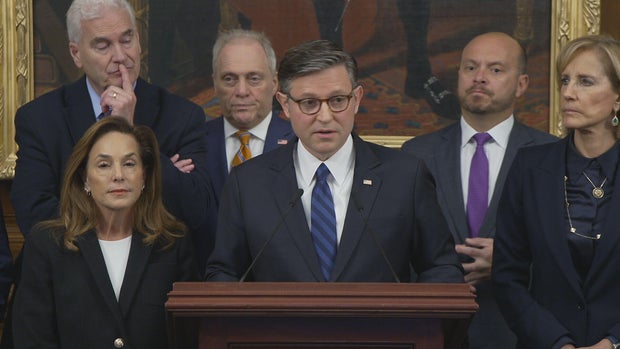
Johnson was asked about his earlier comments that the Senate would vote on the continuing resolution today. A reporter noted that no vote is currently scheduled, and asked if Johnson agreed with Thune's approach.
"I'm not going to second-guess his decisions on when they schedule the votes each time, but he's probably about had it with their nonsense," Johnson said. "And when they tell him, and they thumb their nose at him, and say other things — they like to drop the F-bomb now for fun, for emphasis apparently — when they tell him those things, he probably recognizes it's a futile effort. He realizes they're dug in. They don't care."
The speaker was asked about the ramped-up pace of talks in the Senate over ending the shutdown.
"I'm not surprised that the conversations are turning up in earnest. I mean, when you're talking about the handful of centrists and moderates who are there, they feel the pressure of this," Johnson said. "You have all the major unions now coming out, as we've noted, demanding that they do the right thing and get the paychecks flowing again. You have flights being delayed and canceled. It harms people under nutrition and their food and everything else. So this is not a surprise to us. We welcome them doing the right thing, but again, we don't have anything to negotiate because we didn't put any partisan Republican priorities on the CR at all."
He added: "Our urge and our plea to them is just do the darn right thing and open the government and then we'll figure all the rest of these things out … We've got to get the lights turned back on here, and get the services provided to the people, so that we can come here and do the rest of the legislative job."
House Speaker Mike Johnson said at the Capitol that he sees no indication that Democrats are preparing to back down.
"The Democrats, incredibly, are showing no signs at all that they want to end their shutdown," Johnson said at his daily press conference.
Johnson indicated that Democratic senators will have another chance to vote on the House-passed funding bill on Thursday, although no votes are currently scheduled.
"Now, they'll have another opportunity today," Johnson said. "The Democrats in the Senate will have their 15th opportunity to do the right thing. We're concerned that they won't, and if they reject this for the 15th time, they will be ensuring that this shutdown continues past the Nov. 1 deadline."
The next vote in the Senate will be the 14th time the upper chamber has tried to pass the House bill. Johnson includes the House's original vote in his tally of times the Democrats have voted to block it.
The speaker said the Saturday deadline is "fateful … for a number of reasons."
"Starting on Saturday, let me give you a list of things that this means for the American people: it means that tens of millions of American families will struggle to keep food on the table, because the SNAP program benefits will run dry. It means that WIC assistance — that's Women, Infants and Children, nutrition programs — will be at risk of running dry. It means that Head Start centers, which serve 60,000 children nationwide, will be at risk of closure," Johnson said. "Millions of federal workers … will miss their paychecks."
Speaking on CNBC this morning, Senate Majority Leader John Thune said "there are a lot more conversations going on now" between Republicans and Democrats than "perhaps there were a couple of weeks ago."
"This is something we ought to be able to work out. It's simply funding the government so that we can fund the rest of the government through the normal appropriations process," he said. "And the Democrats have tried to make it about everything else, and all we're simply doing is saying, let's pass a funding bill and keep the government open."
Asked what the path for ending the shutdown is, Thune said "we just need five more Democrats," and reiterated his belief that the Democratic leadership will not be dictating the final resolution.
"If this happens, I think it happens through the rank-and-file Democrats who come to the conclusion that this isn't in anybody's best interest, and I think that's going to happen," he said. "It's always a matter of time."
Thune said elections in several states next week could provide a catalyst for resolving the standoff.
"I think it will make a difference. You have to get past Tuesday. You've got those two off-year elections in New Jersey and Virginia. I think there's a lot of attention being paid to, we don't want to suppress turnout by appearing like supposedly we've caved or folded or something like that," he said, referring to Democrats. "I mean, I don't view it that way, through that lens. Unfortunately, I think this is about real people who are being hurt every day by this government shutdown … If it is about politics, hopefully after next week, maybe it gets a little bit easier."
The Senate will convene at 10 a.m. and hold a series of votes beginning at 11:45 a.m. A vote on the House-passed continuing resolution is not currently on the schedule.
Senators will first consider a resolution about the National Petroleum Reserve in Alaska and then take up a Democratic measure challenging the emergency declaration that President Trump has used to impose tariffs around the world.
The Senate has passed two resolutions this week that would block the president's tariffs on Brazil and Canada, with each attracting the support of a handful of Republicans. The resolutions require a simple majority to pass, but are mostly symbolic, since they're not expected to be taken up by the House.
Vice President JD Vance will lead a roundtable at the White House on Thursday focused on how the shutdown is impacting air travel, a White House official said.
He will be joined by Transportation Secretary Duffy, Airlines for America CEO and former New Hampshire Gov. Chris Sununu and other industry leaders, the official said.
Duffy has been raising alarms over the shutdown's impact on the aviation industry, warning that staffing shortages are leading to intermittent cancellations and delays as air traffic controllers call off work. The controllers have not been paid since the shutdown began.
The shutdown, now on Day 30, could become the longest shutdown in history next week, eclipsed only by the 34-day 2018-19 shutdown.
Shutdowns are a relatively recent phenomenon and have only begun in their current form in 1980. The longest shutdown, which began in December 2018, involved Mr. Trump's demand for funds to pay for a wall along the U.S.-Mexico border.
President Trump is heading back to Washington Thursday after a three-country visit in Asia. His return comes as Democrats have criticized the president for being away from the U.S. during the nearly monthlong shutdown.
For the first time in weeks, senators expressed cautious optimism on Wednesday about talks aimed at ending the shutdown.
After Senate Majority Leader John Thune told reporters Wednesday morning that talks among rank-and-file senators have "ticked up significantly," saying a "higher level of conversation" is taking place at the member level, senators weighed in more freely with hints of optimism throughout the day.
GOP Sen. Lindsey Graham of South Carolina suggested that the shutdown could end next week, telling reporters "I think it is coming to a close." And a number of other senators spoke of improved talks, as key deadlines put pressure on both sides to reach a resolution to reopen the government.
Sen. Lisa Murkowski, an Alaska Republican, told reporters she's more optimistic. She said there's been a "significant uptick in bipartisan conversation," reiterating what Thune said earlier in the day. Sen. Gary Peters, a Michigan Democrat, pointed to the impact of rising health insurance premiums, saying "obviously now people are starting to see the impact of these increases now that prices are coming out."
While the question of reopening the government remains top of mind, senators are also considering broader funding, seeking an agreement on some full-year appropriations bills. And the conversations come as Republican leaders have made clear they won't negotiate with Democrats, who have demanded an extension of health insurance tax credits, until the government is reopened.
Thune reiterated to reporters Wednesday evening that "the conditions we've stated are the same ones," saying Democrats must reopen the government before negotiating on health care.
Cbs News


